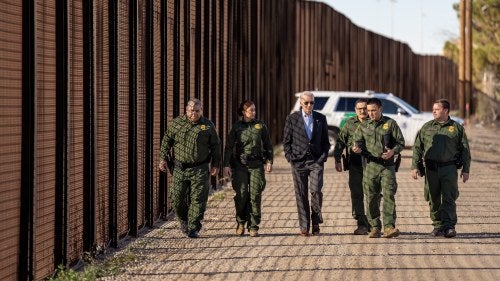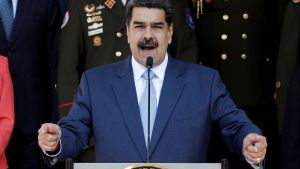Lifting Sanctions Could Reduce Pressure at the US Border

US sanctions on Latin American countries have exacerbated the worsening economic and political conditions behind the current migrant surge.
Migration at the southern border is near its all-time high, renewing debates over immigration policy. The Biden administration has rightfully acknowledged the need to address the root causes of irregular migration and forced displacement. However, the White House has failed to recognize the role US sanctions play in worsening those same migration drivers.
This issue was recently captured in a report from the Center for Economic and Policy Research that assesses 32 quantitative studies on the human impact of economic sanctions. Of these studies, 30 find that sanctions have a negative effect on per capita income, poverty, inequality, mortality, and human rights.
Those effects are evident in Latin American countries where broad-based US sanctions have failed to produce improvements in democracy and human rights and have made conditions unlivable for civilians.
In Cuba, the US trade embargo has cost the country more than $130 billion since 1962. President Barack Obama lifted some sanctions in 2016 during a temporary thaw in US-Cuba relations, but President Donald Trump reversed those gains the next year and expanded sanctions to an unprecedented level. He redesignated Cuba as a state sponsor of terrorism, suspended travel, and barred Americans from sending remittances to their relatives on the island, cutting off a major economic lifeline for many Cubans. These changes, along with a pandemic-induced decline in tourism, led to a 40 percent drop in imports and helped drive the largest-ever Cuban exodus, including 220,000 Cubans fleeing the country in 2022.
Moreover, the embargo severely limits Cuba’s ability to access food and medicine, repair and maintain the energy grid, and prepare for and respond to natural disasters like Hurricane Ian. The original purpose of the embargo was regime change in Cuba, yet the Communist party remains in power.
The Trump administration also imposed broad economic sanctions on Venezuelan oil in 2017, 2019, and 2020, citing concerns over Venezuelan President Nicolas Maduro’s increasingly authoritarian behavior and human rights abuses. However, these sanctions failed to convince Maduro to change course or to secure political change.
Venezuelan oil production declined up to $21 billion a year after each round of sanctions, which tanked the country’s economy. The inflation rate passed one million percent, imports fell by 91 percent, and food imports fell by 78 percent. This had devastating effects on the Venezuelan public, and statements by US officials made clear that the suffering caused by the sanctions was not just collateral damage but part of the administration’s strategy, despite previous assertions that the humanitarian crisis was Maduro’s doing. Today, the Venezuelan exodus is the world’s second-largest refugee crisis. In 2022, 189,000 Venezuelans migrated to the US border, compared to 4,500 in 2020.
These migration surges overwhelm an already dysfunctional US immigration system and undermine progress made in decreased migration from other countries. The Biden administration’s efforts to address root drivers of migration from Mexico and northern Central America coincided with a 43 percent drop in border encounters from August 2021 to August 2022. But this was offset by a 175 percent increase in encounters by Venezuelan, Cuban, and Nicaraguan citizens.
Unsurprisingly, public and congressional support for the US sanctions regime is waning. A study from The Harris Poll shows that a majority of Americans are in favor of lifting sanctions if they damage economic activity and the livelihoods of ordinary citizens (58%) or if they interfere with humanitarian aid and global public health (62%). Earlier this month, 21 members of Congress wrote a letter to Biden urging him to reverse the sanctions on Cuba and Venezuela, and to conduct a broader review on the impact of other US sanctions policies around the world.
While it is important for the United States to defend democratic freedom and human rights, it is entirely counterproductive to enact policies that harm the same people that Washington aims to protect. If Biden wishes to address the root causes of migration, rolling back on sanctions in Latin America is a great place to start.


Related Content
 US Foreign Policy
US Foreign Policy
Research Associate Ethan Kessler explains the benefits and drawbacks of what’s become a major US foreign policy tool.
 Public Opinion
Public Opinion
Political affiliation is far more closely associated with immigration policy preferences than race or ethnicity, polling finds.
 Global Politics
Global Politics
Experts join Deep Dish podcast host Brian Hanson to examine if Venezuelan President Maduro can hold on to his power after a failed coup attempt.
